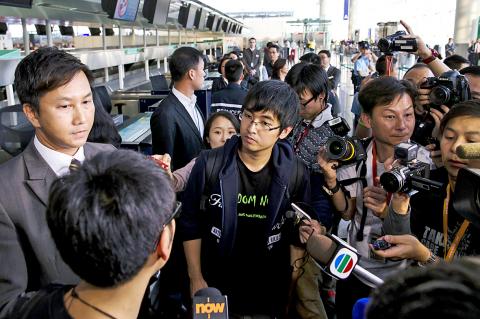Hong Kong student leaders of pro-democracy protests were blocked from flying to Beijing as they sought to meet with Chinese leaders to press their case for open elections for the territory’s chief executive in 2017.
Three members of the Hong Kong Federation of Students were told by airline personnel that they could not board because Chinese authorities canceled their so-called “home return permits,” federation Secretary-General Alex Chow told reporters at Hong Kong International Airport yesterday, in comments broadcast live on Cable TV Hong Kong.
The students had planned to seek talks with Chinese officials on their own after requests to former Hong Kong chief executive Tung Chee-hwa (董建華) and Rita Fan (范徐麗泰), a Hong Kong deputy to China’s National People’s Congress, to arrange a meeting apparently went unheeded. The federation wants Beijing to reverse its decision to vet candidates for Hong Kong’s chief executive election in 2017, the group said in a statement on Facebook.

Photo: Reuters
Hong Kong Police Commissioner Andrew Tsang (曾偉雄) yesterday said that his force would help clear protest sites that have blocked main roads and disrupted the territory for more than seven weeks after a judge dismissed demonstrators’ appeals against orders to remove them.
The street occupations are illegal and protesters should not interfere when the removal of blockades begins, Tsang said in a press briefing broadcast live on Cable TV Hong Kong. He did not say when that would be.
Hong Kong High Court Chief Judge Andrew Cheung Kui-nung’s (張舉能) ruling means that bailiffs can remove obstructions at two protest sites in Mong Kok on the north side of Victoria Harbour. An injunction was also granted against protesters in Admiralty, where the city’s government headquarters are located. Under the injunctions, police are authorized to assist in the clearing and to arrest anyone who interferes.
The ruling risks reigniting violent clashes between police and protesters as government talks with student leaders are stalled. Chinese President Xi Jinping (習近平) last week expressed support for Hong Kong Chief Executive Leung Chun-ying (梁振英) while hosting the APEC summit in Beijing.
The protests were sparked by China’s decision to control the nomination process for the city’s first leadership election in 2017, issuing the biggest challenge that Hong Kong has posed for China since its resumption of sovereignty over the territory in 1997.
The protest movement that has occupied Hong Kong’s streets in main commercial districts since September is losing momentum amid dissent among its leaders and dwindling crowds. Hong Kong Chief Secretary Carrie Lam (林鄭月娥) has ruled out more talks with the students.
The Mong Kok injunctions were brought by taxi and bus drivers who said that their business has been impaired by the blockage of key roads by the students.

SECURITY: As China is ‘reshaping’ Hong Kong’s population, Taiwan must raise the eligibility threshold for applications from Hong Kongers, Chiu Chui-cheng said When Hong Kong and Macau citizens apply for residency in Taiwan, it would be under a new category that includes a “national security observation period,” Mainland Affairs Council (MAC) Minister Chiu Chui-cheng (邱垂正) said yesterday. President William Lai (賴清德) on March 13 announced 17 strategies to counter China’s aggression toward Taiwan, including incorporating national security considerations into the review process for residency applications from Hong Kong and Macau citizens. The situation in Hong Kong is constantly changing, Chiu said to media yesterday on the sidelines of the Taipei Technology Run hosted by the Taipei Neihu Technology Park Development Association. With

CARROT AND STICK: While unrelenting in its military threats, China attracted nearly 40,000 Taiwanese to over 400 business events last year Nearly 40,000 Taiwanese last year joined industry events in China, such as conferences and trade fairs, supported by the Chinese government, a study showed yesterday, as Beijing ramps up a charm offensive toward Taipei alongside military pressure. China has long taken a carrot-and-stick approach to Taiwan, threatening it with the prospect of military action while reaching out to those it believes are amenable to Beijing’s point of view. Taiwanese security officials are wary of what they see as Beijing’s influence campaigns to sway public opinion after Taipei and Beijing gradually resumed travel links halted by the COVID-19 pandemic, but the scale of

A US Marine Corps regiment equipped with Naval Strike Missiles (NSM) is set to participate in the upcoming Balikatan 25 exercise in the Luzon Strait, marking the system’s first-ever deployment in the Philippines. US and Philippine officials have separately confirmed that the Navy Marine Expeditionary Ship Interdiction System (NMESIS) — the mobile launch platform for the Naval Strike Missile — would take part in the joint exercise. The missiles are being deployed to “a strategic first island chain chokepoint” in the waters between Taiwan proper and the Philippines, US-based Naval News reported. “The Luzon Strait and Bashi Channel represent a critical access

Pope Francis is be laid to rest on Saturday after lying in state for three days in St Peter’s Basilica, where the faithful are expected to flock to pay their respects to history’s first Latin American pontiff. The cardinals met yesterday in the Vatican’s synod hall to chart the next steps before a conclave begins to choose Francis’ successor, as condolences poured in from around the world. According to current norms, the conclave must begin between May 5 and 10. The cardinals set the funeral for Saturday at 10am in St Peter’s Square, to be celebrated by the dean of the College